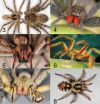Proving 'group selection'
Spider colonies need the correct mix of personalities to survive, says Pitt biology professor in landmark Nature paper
2014-10-01
(Press-News.org) PITTSBURGH—The notion of "group selection"—that members of social species exhibit individual behavioral traits that render a population more or less fit for survival—has been bandied about in evolutionary biology since Darwin. The essence of the argument against the theory is that it's a "fuzzy" concept without the precision of gene-based selection.
Jonathan Pruitt, assistant professor of behavioral ecology in the University of Pittsburgh's Department of Biological Sciences within the Kenneth P. Dietrich School of Arts and Sciences, has published a paper today in the leading journal Nature that may be proof of group selection's validity.
Other studies have hinted at the legitimacy of group selection. But, Pruitt says, "Our study shows group selection acting in a natural setting—on a trait known to be heritable—and that has led to colony-level adaptation."
Pruitt, and colleague Charles Goodnight of the University of Vermont, examined colonies of Anelosimus studiosus spiders composed of a mixture of individuals with docile and aggressive traits. In nature, individual colonies differ in their docile-to-aggressive ratio.
Pruitt constructed experimental colonies of known composition, tweaking the docile-to-aggressive ratio in each. What he found was that docile-to-aggressive ratios are driven by the site at which the colonies are placed. Certain ratios yield high colony survivorship in certain geographical locations but not in others.
Over time, the span of two generations, the docile-to-aggressive ratios of perturbed native colonies—those that have lost their site-specific optimal docile-to-aggressive ratio—change. Colonies that find themselves at risk of extinction reestablish their group composition to better match the ratio that their native site calls for. The experimental colonies that were moved across sites, however, changed their ratio to one that "would have promoted their survival had they remained at their home site, regardless of their contemporary environment," Pruitt says.
"These findings provide compelling evidence that the mechanisms that colonies use to regulate their compositions are themselves locally adapted, presumably because of the survival advantages they confer to the colony," Pruitt says.
INFORMATION:
Joe Miksch, University of Pittsburgh News Services
[412-624-4356 (office); 412-997-0314 (cell); jmiksch@pitt.edu]
ELSE PRESS RELEASES FROM THIS DATE:
2014-10-01
Spiders found in international cargo brought into North America are sometimes submitted to arachnologists for identification. Often, these spiders are presumed to be of medical importance because of their size or similarity to spiders that are known to be venomous.
In 2006, after witnessing multiple episodes where harmless spiders were mistaken for toxic ones, Dr. Richard Vetter, an arachnologist at the University of California, asked other arachnologists to provide data on specimens they found in international cargo that had been submitted to them for identification. ...
2014-10-01
New insights into botulinum neurotoxins and their interactions with cells are moving scientists ever closer to safer forms of Botox and a better understanding of the dangerous disease known as botulism. By comparing all known structures of botulinum neurotoxins, researchers writing in the Cell Press journal Trends in Biochemical Sciences on October 1st suggest new ways to improve the safety and efficacy of Botox injections.
"If we know from high-resolution structures how botulinum neurotoxins interact with their receptors, we can design inhibitors or specific antibodies ...
2014-10-01
WASHINGTON— The Society for Public Health Education (SOPHE) proudly announces the publication of a Health Education & Behavior (HE&B) supplement devoted to the latest research and practice to promote healthy aging. The October 2014 supplement, "Fostering Engagement and Independence: Opportunities and Challenges for an Aging Society," contains a dozen peer-reviewed articles on innovative behavioral and psycho-social approaches to improve the health of the nation's fastest growing cohort - older adults.
Together the articles describe promising advances in research directed ...
2014-10-01
BEIJING; BERKELEY, CA; and UPTON, NY - The Daya Bay Collaboration, an international group of scientists studying the subtle transformations of subatomic particles called neutrinos, is publishing its first results on the search for a so-called sterile neutrino, a possible new type of neutrino beyond the three known neutrino "flavors," or types. The existence of this elusive particle, if proven, would have a profound impact on our understanding of the universe, and could impact the design of future neutrino experiments. The new results, appearing in the journal Physical Review ...
2014-10-01
CUMBERLAND, MD (October 1, 2014)--When scientists talk about the consequences of climate change, it can mean more than how we human beings will be impacted by higher temperatures, rising seas and serious storms. Plants and trees are also feeling the change, but they can't move out of the way. Researchers at the University of Maryland Center for Environmental Science and University of Vermont have developed a new tool to overcome a major challenge of predicting how organisms may respond to climate change.
"When climate changes, organisms have three choices: migrate, adapt, ...
2014-10-01
BUFFALO, N.Y. — If a person is dually diagnosed with a severe mental illness and a substance abuse problem, are improvements in their mental health or in their substance abuse most likely to reduce the risk of future violence?
Although some may believe that improving symptoms of mental illness is more likely to lessen the risk for future episodes of violence, a new study from the University at Buffalo Research Institute on Addictions (RIA) suggests that reducing substance abuse has a greater influence in reducing violent acts by patients with severe mental illness. ...
2014-10-01
New Rochelle, NY, October 1, 2014—Regulation of the human immune system's response to infection involves an elaborate network of complex signaling pathways that turn on and off multiple genes. The emerging importance of long noncoding RNAs and their ability to promote, fine-tune, and restrain the body's inflammatory response by regulating gene expression is described in a Review article in Journal of Interferon & Cytokine Research (JICR), a peer-reviewed publication from Mary Ann Liebert, Inc., publishers. The article is available free on the JICR website.
In the Review ...
2014-10-01
COLUMBIA, Mo. – Relational aggression, or "mean girl" bullying, is a popular subject in news and entertainment media. This nonphysical form of aggression generally used among adolescent girls includes gossiping, rumor spreading, exclusion and rejection. As media coverage has illustrated, relational aggression can lead to tragic and sometimes fatal outcomes. Despite these alarming concerns, little has been done to prevent and eliminate these negative behaviors. Now, University of Missouri researchers have developed and tested an intervention that effectively decreases relational ...
2014-10-01
This news release is available in French and Spanish. The Commission for Environmental Cooperation (CEC) has released a comprehensive report on the changing face of industrial pollution in North America, covering the years 2005 through 2010. This is the first time an edition of the CEC's Taking Stock series, which gathers data from pollutant release and transfer registers (PRTRs) in Canada, Mexico and the United States, has analyzed North American pollutant information over an extended timeframe. To view the report, visit http://www.cec.org/library.
This volume ...
2014-10-01
Biological sensors, or biosensors, are like technological canaries in the coalmine. By converting a biological response into an optical or electrical signal, they can alert us to dangers in our external and internal environments. They can sense toxic chemicals and particles in the air and enzymes, molecules, and antibodies in the body that could indicate diabetes, cancer, and other diseases.
An optical biosensor works by absorbing a specific bandwidth of light and shifting the spectrum when it senses minor changes in the environment. The narrower the band of absorbed ...
LAST 30 PRESS RELEASES:
[Press-News.org] Proving 'group selection'
Spider colonies need the correct mix of personalities to survive, says Pitt biology professor in landmark Nature paper



